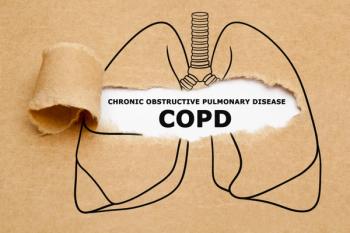
While smoking is a key risk factor for chronic obstructive pulmonary disease (COPD), significant prevalence also exists among nonsmokers, highlighting the need for broader public health strategies.

Brooke is an associate editor for The American Journal of Managed Care® (AJMC®). She joined AJMC in 2023, where she produces content covering multiple disease states.
She has a BA in journalism from Seton Hall University. You can connect with Brooke on LinkedIn.

While smoking is a key risk factor for chronic obstructive pulmonary disease (COPD), significant prevalence also exists among nonsmokers, highlighting the need for broader public health strategies.

Andrew Leitner, MD, of City of Hope, discusses the challenges of integrating supportive care into cancer treatment and proposes solutions to improve access for patients from underserved communities.

The House of Representatives unanimously passed the bipartisan Seniors’ Access to Critical Medications Act (HR 5526), which would reverse CMS restrictions on mail delivery of cancer medications to Medicare beneficiaries.

Linda Bosserman, MD, PhD, FASCO, FACP, of City of Hope, emphasizes the need for a sustainable health care system that balances cost with care so patients can achieve the best survival and quality of life after a cancer diagnosis.

A poster presented at the Skin of Color Update reported that hidradenitis suppurativa (HS) disproportionately affects Black patients, women, smokers, and those with public insurance or disabilities.

Andrew Leitner, MD, City of Hope, highlights the essential role of supportive care in improving the quality of life of patients with cancer undergoing treatment.

Linda Bosserman, MD, PhD, FASCO, FACP, of City of Hope, highlights challenges in cancer care, focusing on improving access to accurate diagnoses and treatments, promoting patient-centered approaches, and fostering collaboration to achieve better outcomes.

The FDA has approved FluMist (AstraZeneca) for self-administration by adults up to age 49 years or for caregiver administration for children aged 2 to 17 years, making it the first self-administered flu vaccine option.

The proposed Medicare High-Value Drug List Model, also known as the Medicare $2 Drug List, could have modestly reduced out-of-pocket costs for 38% of beneficiaries if implemented in 2021.

Joseph Alvarnas, MD, of City of Hope, discusses how he envisions the future of cancer care over the next decade.

Researchers developed a pan-immune-inflammation–based nomogram to accurately predict overall survival (OS) and progression-free survival (PFS) in patients with epithelial ovarian cancer

Joseph Alvarnas, MD, of City of Hope, recaps yesterday's Institute for Value-Based Medicine® (IVBM) event on value-based oncology care, emphasizing patient-centered approaches and how attendees can apply these insights in their daily practice.

On this episode of Managed Care Cast, we're talking with the author of a study published in the September 2024 issue of The American Journal of Managed Care® that explored the factors consumers consider essential for an adequate provider network.

Hilary Baldwin, MD, FAAD, highlighted diagnostic complexities and shared treatment strategies for rosacea in patients with darker skin tones at the Skin of Color Update in New York City last Friday.

Jennifer Green, MD, of Duke University, stresses the need for high-risk patients with diabetes to use medications that prevent future cardiovascular and kidney events.

Valerie M. Harvey, MD, MPH, FAAD, founder of the Hampton Roads Center for Dermatology, highlighted the long-standing underrepresentation of minority populations in dermatology clinical trials at the Skin of Color Update 2024 in New York City on Friday.

The FDA has approved lebrikizumab (Ebglyss; Eli Lilly) as a new first-line biologic treatment for patients aged 12 and older with moderate to severe atopic dermatitis (AD).

Experts at the Skin of Color Update today in New York City highlighted recent FDA-approved dermatological treatments and emphasized the importance of clinical trial diversity.

Jennifer Green, MD, of Duke University, explained that while CMS-negotiated drug prices under the Inflation Reduction Act (IRA) may not immediately lower patients' costs, they could improve access to expensive medications.

Adding bevacizumab to the combination therapy of carboplatin and paclitaxel significantly improved progression-free survival (PFS) in patients with epithelial ovarian cancer (EOC) but not overall survival (OS).

Social frailty in patients with acute exacerbations of chronic obstructive pulmonary disease (COPD) does not directly impact anxiety or depression but influences these conditions indirectly through social support.

Ken Cohen, MD, of Optum Care, advocates for glucagon-like peptide 1 (GLP-1) tiering for patients with diabetes based on comorbidities, like body mass index (BMI) and cardiovascular disease (CVD).

During the Delta wave of COVID-19, higher caseload strain negatively impacted patient survival rates across US hospitals, regardless of their size or resources.

Spouses and first-degree relatives of patients with genitourinary (GU) cancers face increased risks of developing cardiovascular and psychological comorbidities, particularly within the first year of diagnosis.

Samyukta Mullangi, MD, MBA, medical director at Thyme Care, explained her excitement to meet with industry leaders, share best practices, and learn about new innovations in oncology care at Patient-Centered Oncology Care® (PCOC) 2024.

A small 5-year all-cause mortality risk increase among patients with chronic obstructive pulmonary disease (COPD) using roflumilast was found in Germany and the US.

Compared with those without vitiligo, patients with vitiligo have higher health care access and utilization but report a lower quality of life.

Ty J. Gluckman, MD, FACC, FAHA, of Providence St. Joseph Health, emphasizes the need for better prevention of cardiovascular risks and discusses upcoming advances in glucagon-like peptide 1 (GLP-1) therapies.

Ian Neeland, MD, of University Hospitals and Case Western Reserve University, recommended a team-based, comprehensive approach to managing diabetes and its related complications.

Manisha Jhamb, MD, MPH, of the University of Pittsburgh Medical Center (UPMC), is excited about CMS's negotiated drug prices under the Inflation Reduction Act (IRA) for patients with kidney disease; conversely, she highlights the challenge of low kidney disease awareness.

259 Prospect Plains Rd, Bldg H
Cranbury, NJ 08512
© 2025 MJH Life Sciences®
All rights reserved.
